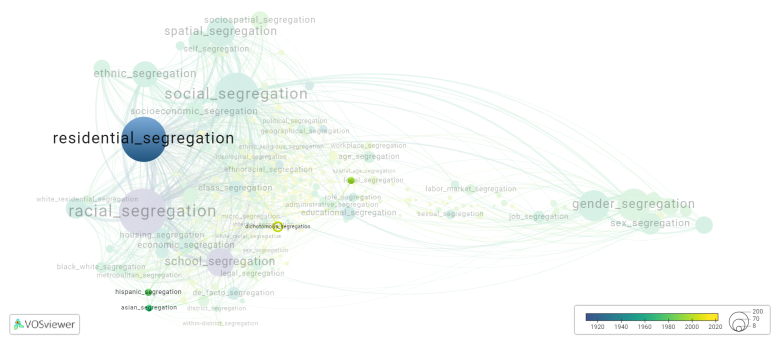Dichotomous segregation: Difference between revisions
(Creating page) |
(Creating page) |
||
| (7 intermediate revisions by the same user not shown) | |||
| Line 11: | Line 11: | ||
Historically, dichotomous segregation has been seen in various contexts, such as apartheid in South Africa, racial segregation in the United States during the Jim Crow era, and caste-based segregation in India. However, its effects can also be observed in contemporary societies around the world. Efforts to address dichotomous segregation often involve policies and initiatives aimed at promoting inclusivity, equal rights, and social integration. | Historically, dichotomous segregation has been seen in various contexts, such as apartheid in South Africa, racial segregation in the United States during the Jim Crow era, and caste-based segregation in India. However, its effects can also be observed in contemporary societies around the world. Efforts to address dichotomous segregation often involve policies and initiatives aimed at promoting inclusivity, equal rights, and social integration. | ||
==== | ==See also== | ||
==Related segregation forms== | |||
Dichotomous segregation is frequently discussed in the literature with the following segregation forms: | |||
[[residential segregation]] | |||
[[File:dichotomous_segregation.png|780x780px]] | |||
This visualization is based on the study [[Segregation_Wiki:About| The Multidisciplinary Landscape of Segregation Research]]. | |||
For the complete network of interrelated segregation forms, please refer to: | |||
* [https://tinyurl.com/2235lkhw First year of publication] | |||
* [https://tinyurl.com/2d8wg5n3 Louvain clusters] | |||
* [https://tinyurl.com/223udk5r Betweenness centrality] | |||
* [https://tinyurl.com/244d8unz Disciplines in which segregation forms first emerged (Scopus database).] | |||
==References== | ==References== | ||
==Notes== | ==Notes== | ||
<references /> | <references /> | ||
{{NoteAI}} | {{NoteAI}} | ||
==Dichotomous | ==Dichotomous segregation appears in the following literature== | ||
Hao L., Fong E. (2011 | Hao L., Fong E. (2011). Linking dichotomous segregation with multi group segregation: Weighted segregation ratios in selected U.S. metropolitan areas. ''Social Science Research'', ''40''(1), 379-391. https://doi.org/10.1016/j.ssresearch.2010.05.005 | ||
Latest revision as of 07:17, 16 October 2024
Date and country of first publication[1][edit | edit source]
2011
United States
Definition[edit | edit source]
Dichotomous segregation refers to a form of racial or ethnic segregation that divides a society into two distinct and separate groups based on a single binary categorization. This categorization can be based on characteristics such as race, ethnicity, religion, or nationality.
In a dichotomously segregated society, individuals are classified into one of two exclusive groups, with limited or no mobility between the groups. This segregation can manifest in various ways, including residential segregation, educational segregation, economic segregation, and social segregation.
Dichotomous segregation often leads to unequal access to resources, opportunities, and social privileges for the marginalized group. It can create barriers to upward mobility, reinforce stereotypes, and perpetuate social divisions and inequalities.
Historically, dichotomous segregation has been seen in various contexts, such as apartheid in South Africa, racial segregation in the United States during the Jim Crow era, and caste-based segregation in India. However, its effects can also be observed in contemporary societies around the world. Efforts to address dichotomous segregation often involve policies and initiatives aimed at promoting inclusivity, equal rights, and social integration.
See also[edit | edit source]
Related segregation forms[edit | edit source]
Dichotomous segregation is frequently discussed in the literature with the following segregation forms:
This visualization is based on the study The Multidisciplinary Landscape of Segregation Research.
For the complete network of interrelated segregation forms, please refer to:
References[edit | edit source]
Notes[edit | edit source]
- ↑ Date and country of first publication as informed by the Scopus database (December 2023).
At its current state, this definition has been generated by a Large Language Model (LLM) so far without review by an independent researcher or a member of the curating team of segregation experts that keep the Segregation Wiki online. While we strive for accuracy, we cannot guarantee its reliability, completeness and timeliness. Please use this content with caution and verify information as needed. Also, feel free to improve on the definition as you see fit, including the use of references and other informational resources. We value your input in enhancing the quality and accuracy of the definitions of segregation forms collectively offered in the Segregation Wiki ©.
Dichotomous segregation appears in the following literature[edit | edit source]
Hao L., Fong E. (2011). Linking dichotomous segregation with multi group segregation: Weighted segregation ratios in selected U.S. metropolitan areas. Social Science Research, 40(1), 379-391. https://doi.org/10.1016/j.ssresearch.2010.05.005

